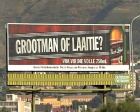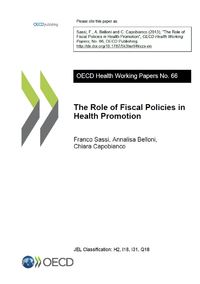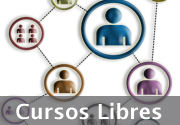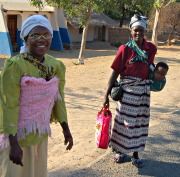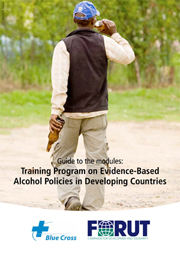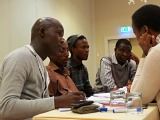Policies, education and mobilization
Despite the enormity of the challenge, evidence and experience strongly suggest that substance use problems can be reduced. Such efforts require the political will to tackle the problems and a smart mix of government policies, education activities, and mobilization of communities and NGOs. Particular attention should focus on implementing evidenced-based strategies, which necessarily include interventions to reduce the availability and the affordability of alcohol and illicit drugs.
New report:
Alcohol Marketing and Regulatory Policy Environment in India
India’s alcohol consumption is increasing by 10-15 per cent per year, and among drinkers binge drinking is the dominating pattern. India is now one of the key emerging markets for the global spirits industry.
Professor Sally Casswell, SHORE, New Zealand:
- Policy responses to alcohol marketing are urgently needed
The global exposure of young people to alcohol marketing requires an urgent policy response. Engagement by NGOs and governments independent from commercial interests is needed. This is the conclusion of Professor Sally Casswell in an article in the journal Addiction.
ADIC: Sri Lankan "NGO of the Year"
The Alcohol and Drug Information Centre (ADIC) in Colombo has been named «NGO of the Year» in 2013 by the Sri Lankan newspaper The Nation. This was announced late December 2013. – A great motivation, comments the ADIC Director, Pubudu Sumanasekera.
OECD Health working paper:
Tax alcohol for health
A recent working paper "The Role of Fiscal Policies in Health Promotion" concludes that the arguments in support of taxes being used to attain public health objectives are strong for tobacco products and alcoholic beverages.
PAHO online resources:
Self learning on alcohol and drug policy
The Pan-American Health Organization (PAHO) has introduced Self-Learning Courses on several aspects of alcohol and drug harm and policy. The virtual courses may be accessed by anyone and are available in English and Spanish.
The Lancet Commission points to alcohol taxation for health
A new report published by The Lancet says there is an enormous payoff from investing in health and that fiscal policies are a powerful and underused lever for curbing of non-communicable diseases and injuries. Taxing tobacco, alcohol and other harmful substances are among the reccommendations.
Half the world’s adults do not drink alcohol – what should the policy implications be?
Non-drinkers make up nearly half the world’s adult population. A paper presented at the GAPC conference in Seoul suggests what the policy implications of this may be, in particular for developing countries which have remarkable high segments of non-drinkers in their populations.
Training Programme on Evidence-based Alcohol Policy
A new Training Manual to support evidence-based alcohol policy development in low income settings is now available! The manual has been developed on the basis of pilot trainings in seven African countries.
WHO Afro and FORUT: Cooperation agreement signed
WHO Regional Office for Africa and FORUT have signed a Memorandum of Understanding to promote evidence-based alcohol policies in Africa. The new agreement defines areas of cooperation between the two parties.
National Alcohol Policy Alliance formed in Lesotho
Civil society organizations in Lesotho have come together to form the Alcohol Policy Alliance Lesotho. The new network aims at being a watchdog for and supporter of evidence-based alcohol policies in the country.

